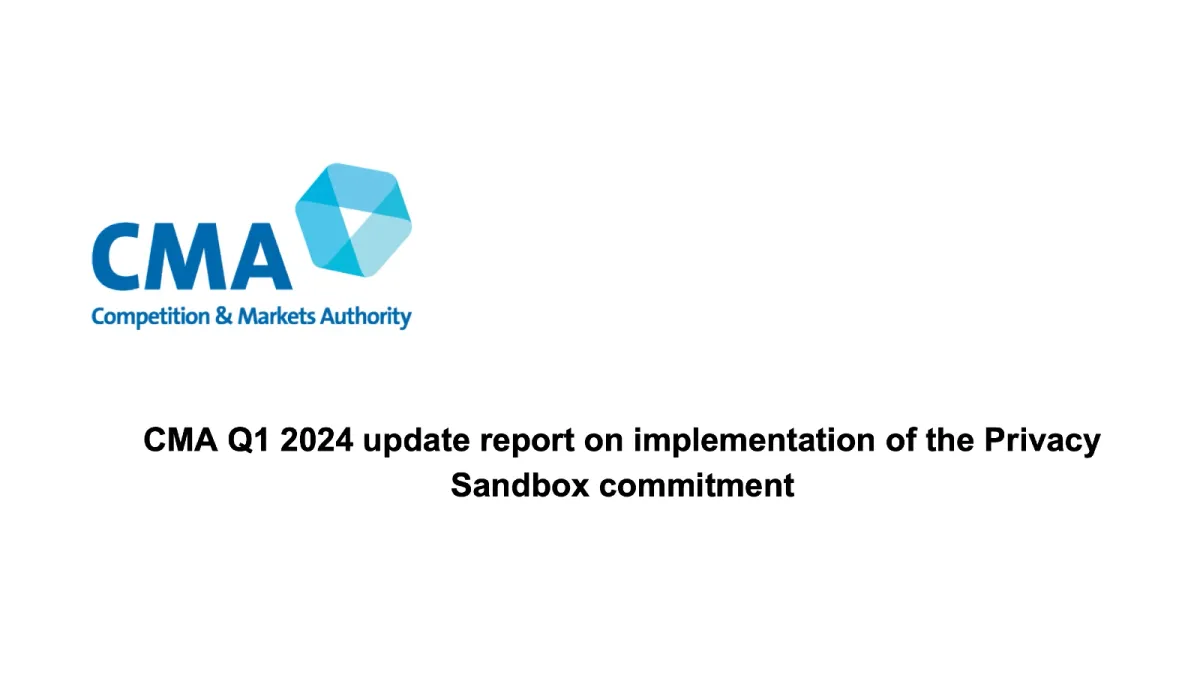
The Competition and Markets Authority (CMA), the UK's competition regulator, has expressed concerns regarding Google's Privacy Sandbox initiative, particularly in the period between January and March 2024. Here's a breakdown of the CMA's key viewpoints during this timeframe:
Reduced Competition: The CMA raised concerns that the Privacy Sandbox, with its emphasis on Google-developed tools and APIs, could stifle competition within the online advertising market. They highlighted the possibility of Google prioritizing its own advertising services over those of competitors. This could potentially disadvantage smaller ad tech companies who may not have the same level of resources to adapt to the changing landscape.
Limited User Control: The CMA also expressed worries about the lack of robust privacy controls within certain aspects of the Privacy Sandbox. They argued that some proposed APIs might restrict user choice and control over their data. This contradicts the core principle of the Sandbox, which is to enhance user privacy. The CMA urged Google to address these concerns and implement stronger privacy safeguards before completely phasing out third-party cookies.
Transparency and Scrutiny: The CMA emphasized the need for transparency throughout the development and implementation of the Privacy Sandbox. They requested Google to provide clearer details about the functionalities and limitations of the new tools and APIs. This would allow for proper scrutiny and ensure that the Sandbox operates in a fair and competitive manner.
CMA's Stance: In their March 2024 update, the CMA didn't explicitly oppose the Privacy Sandbox itself. They acknowledged the initiative's potential benefits for user privacy. However, they called for Google to address the competition and user control concerns before completely removing third-party cookies. This suggests the CMA is willing to work with Google to find a solution that balances user privacy with a fair and competitive online advertising market.
The online advertising industry is on the verge of a major shift with the implementation of Google's Privacy Sandbox. This initiative, announced on January 25, 2022, aims to transform how advertisers track users online while prioritizing user privacy. Marketers need to grasp the implications of the Privacy Sandbox to navigate this evolving landscape effectively.
The online advertising industry received a reprieve in March 2024 when Google announced a delay in phasing out third-party cookies in Chrome. Originally slated for removal in late 2024, the cookies will now be sunset in early 2025. This decision comes amidst ongoing scrutiny from regulators, particularly the UK's Competition and Markets Authority (CMA). While Google hasn't explicitly linked the delay to the CMA's concerns, the timing suggests a potential connection.
 PPC LandLuís Daniel Rijo
PPC LandLuís Daniel Rijo
According to a recent update by the Competition and Markets Authority (CMA) on March 8, 2024, Google's Privacy Sandbox is a collection of tools designed to limit advertisers' ability to track users across websites. This is achieved primarily by phasing out third-party cookies, which have been the backbone of online advertising for over two decades.
Third-party cookies are small pieces of data that websites store on a user's device. These cookies are placed by websites other than the one a user is currently visiting (hence the name "third-party"). Advertisers rely on third-party cookies to track users across different websites, building a profile of their interests and browsing habits. This data is then used to target users with personalized ads.
For example, if a user visits a sports website and then browses a news website, a third-party cookie from an advertising company might track this activity. The advertiser can then use this information to show the user ads related to sports equipment or sporting events on the news website.
While third-party cookies have been instrumental in online advertising success, they have also raised privacy concerns. Users have become increasingly wary of being tracked online without their knowledge or consent. Regulators around the world have also been scrutinizing the use of third-party cookies, citing privacy violations.
The Privacy Sandbox is Google's response to these growing privacy concerns. It aims to provide users with more control over their data by limiting the ability of advertisers to track them across websites. This is achieved through various mechanisms, such as:
- Cohort-based advertising: Instead of tracking individual users, advertisers can target groups of users with similar interests. This approach reduces the amount of personal data collected.
- Privacy-preserving APIs: Google is developing new APIs that allow advertisers to target ads without directly identifying users.
The CMA, the UK's competition regulator, has expressed concerns that Google's Privacy Sandbox could stifle competition in the online advertising market. The CMA's update in March 2024 highlights that Google may prioritize its own advertising services over those of competitors. This could put smaller ad tech companies at a disadvantage.
The CMA also raised concerns about the lack of privacy controls in certain Privacy Sandbox APIs. This could potentially limit user choice and control over their data. The CMA has urged Google to address these concerns before it can completely deprecate third-party cookies.
What does the Privacy Sandbox mean for marketers?
The Privacy Sandbox presents both challenges and opportunities for marketers. With the phasing out of third-party cookies, marketers will need to adapt their targeting strategies. Here are some key considerations for marketers:
- Focus on first-party data: Marketers should prioritize collecting and utilizing first-party data, which is data collected directly from their customers. This could include email addresses, website behavior, and purchase history.
- Invest in contextual targeting: Contextual targeting involves placing ads on websites that are relevant to the content of the page. This approach can be effective even without individual user tracking.
- Explore Privacy Sandbox solutions: As the Privacy Sandbox develops, marketers should explore the new tools and APIs that become available. These solutions may offer new ways to target audiences while respecting user privacy.
In conclusion, Google's Privacy Sandbox is a significant development that will reshape online advertising.

